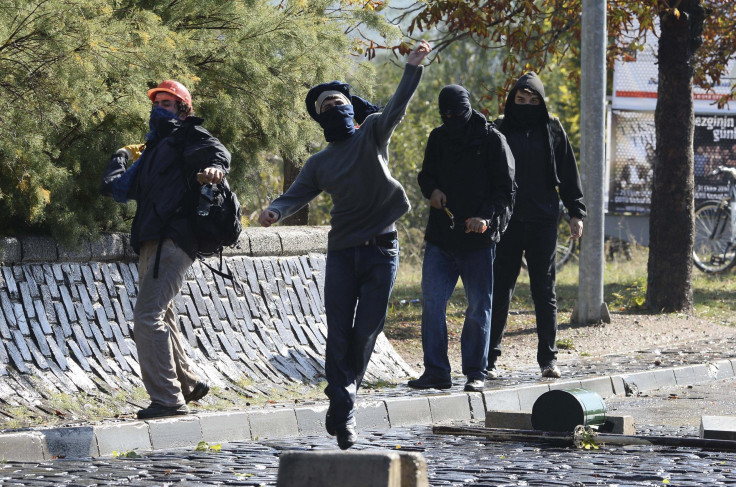ISIS And Kobane Help Reignite Protests And Violence Across Turkey Between Kurds And Turks

The Islamic State group may have indirectly reignited longstanding unrest within Turkey's borders and could drive an even larger wedge between the Turkish government and the Turkish-Kurdish population. In the past 72 hours, protests have rocked 30 cities and even spread to Istanbul University on Thursday. Some clashes are between Kurds and police forces, some are between Islamic State supporters and anti-militant demonstrators, but so far, the deadliest were between extremist Sunni Kurdish groups and anti-ISIS Kurds.
Protests continued in Turkey on Thursday despite an army-imposed curfew in Kurdish provinces. Security forces have resorted to water cannons and tear gas to disperse protesters, according to Agence-France Presse. Since Monday, 23 people have died, 170 police officers were wounded and more than 200 people were arrested across the country.
Turkey’s Kurdish population has long been in conflict with the Turkish government and has been trying to gain independence for most of the last 30 years. Last year, the conflict appeared to be settling down with the signing of a cease-fire. But tensions began to rise this summer as the Kurdish populations in Syria and Iraq were increasingly targeted by the ISIS advance.
The Turkish Kurds criticized their government’s inaction in the current fighting taking place in the Syrian border town of Kobane, also known as Ayn al-Arab. Syrian-Kurdish People's Protection Units (YPG) forces have been besieged by ISIS for weeks within view of the border, but Turkey, a NATO member, has yet to intervene, despite the U.S.-led coalition bombing ISIS in the area.
Turkey has been very reluctant to play an active role in the anti-ISIS coalition unless the operation also aims to oust Syrian President Bashar Assad. Foreign Minister Mevlut Cavusoglu said Thursday, “It is not realistic to expect that Turkey will lead a ground operation on its own."
The fighting in Kobane evidently has brought up old resentments of Turkey’s Kurdish population and fueled their mistrust for the government.
“The demonstrators are not demanding ground troops from Turkey, nor from the coalition,” Guney Yildiz, a journalist and Turkey-Kurdish affairs analyst, told Middle East Eye. “They are protesting against what they perceive as Turkey’s support for IS [ISIS].”
Two weeks ago, the Kurdistan Workers Party (PKK), which battled the Turkish state for decades, issued a statement accusing Turkey of supporting the militant group and called on Turkish Kurds to join the fight in Kobane, which Turkey has forbidden. The statement claimed that Turkey "is continuing to give support to ISIL with arms and logistics. It is partnering ISIL in the attack on Kobane."
Despite the rising unrest, Turkish President Recep Tayyip Erdoğan is committed to reaching an agreement with the Kurdish faction. Erdogan said Thursday that he would not let the protests “sabotage” the already fragile relationship.
“It’s obvious that this play targets the peaceful environment in the east and southeast as well as the resolution process and our brotherhood,” Erdoğan said in a written statement via Hurriyet Daily News. “Launching violent acts in Turkey under the pretext of terror attacks against Kobane shows the real intention behind these moves.”
© Copyright IBTimes 2025. All rights reserved.






















